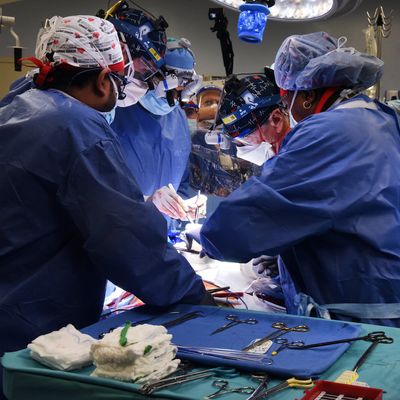
Surgeons at the University of Maryland Medical Center transplanted a heart from a genetically modified pig into a human patient with terminal heart disease Friday. It was the first successful pig-to-human heart transplant ever performed and could mark the beginning of a new era for xenotransplantation, offering new hope for the severely ill who face an ever present shortage of organs from human donors.
The Maryland man who underwent the breakthrough procedure, 57-year-old David Bennett, was out of other medical options and too ill to be eligible for a human heart transplant. He understood the transplant was highly experimental but was willing to take the risk. “It was either die or do this transplant,” he said in a statement prior to the eight-hour surgery. “I want to live. I know it’s a shot in the dark, but it’s my last choice.”
Though Bennett’s prognosis remains uncertain, he was still doing well three days after the operation, doctors at the hospital said Monday. They will continue to monitor him for the foreseeable future; a combination of drugs was administered to Bennett to prevent his immune system from rejecting the organ.
Regardless, Bennett’s doctors said the transplant has now proved that a heart from a genetically modified animal can indeed function inside a human body without immediately being rejected. “It creates the pulse, it creates the pressure, it is his heart,” remarked Dr. Bartley Griffith, who performed the operation and is the director of the University of Maryland Medical Center’s cardiac-transplant program. Dr. Griffith said that after he discussed the possible transplant with Bennett last month, Bennett responded, “Well, will I oink?”
Every day, roughly a dozen Americans on organ transplant lists die as demand for replacement organs always outstrips the supply from other people, the New York Times noted Monday. More than 41,000 Americans received transplanted organs last year, including more than 3,800 who received hearts from human donors. One way scientists have sought to address the shortage is to use organs from animals that have been genetically altered so as to make it less likely human bodies will reject their organs. Porcine organs have proved particularly promising, as the Times explains:
Pigs offer advantages over primates for organ procurements, because they are easier to raise and achieve adult human size in six months. Pig heart valves are routinely transplanted into humans, and some patients with diabetes have received porcine pancreas cells. Pig skin has also been used as a temporary graft for burn patients.
Two newer technologies — gene editing and cloning — have yielded genetically altered pig organs less likely to be rejected by humans.
“If this works, there will be an endless supply of these organs for patients who are suffering,” commented Dr. Muhammad Mohiuddin, the director of the cardiac xenotransplantation program at the University of Maryland School of Medicine, regarding Bennett’s operation. Mohiuddin and Griffith have been studying the technique they used for Bennett’s transplant for five years.
According to the Baltimore Sun, while the Food and Drug Administration hasn’t approved porcine heart transplants, it authorized the surgery under what’s known as the agency’s “compassionate use” provision, which allows for experiment treatments when none other are available.
In an earlier scientific breakthrough in September, surgeons at NYU Langone Health in New York successfully attached a kidney from a genetically modified pig into a brain-dead human patient on life support (with the permission of the patient’s relatives). The organ functioned as well as a human transplant for the more than two days researchers tracked it.
As Vox’s Dylan Matthews — who is himself a kidney donor — highlighted after that experiment, while there is no question xenotransplantation is a promising medical frontier that could extend or save countless human lives, there are moral and ethical questions to consider as well.































